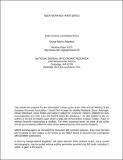| dc.contributor.author | Angeletos, George-Marios | |
| dc.date.accessioned | 2021-10-27T20:29:27Z | |
| dc.date.available | 2021-10-27T20:29:27Z | |
| dc.date.issued | 2018 | |
| dc.identifier.uri | https://hdl.handle.net/1721.1/135819 | |
| dc.description.abstract | The notion that business cycles are driven by fluctuations in aggregate demand is subtle. I first review some of the conceptual and empirical challenges faced when trying to accommodate this notion in micro-founded, general-equilibrium models. I next review my own research, which sheds new light on the observed business cycles by accommodating frictional coordination in the form of higher-order uncertainty. This makes room for forces akin to animal spirits even when the equilibrium is unique. It allows demand shocks to generate realistic business cycles even when nominal rigidity is absent or undone by appropriate monetary policy. It modifies the general-equilibrium predictions of workhorse macroeconomic models in manners that seem both conceptually appealing and empirically relevant. And it offers new guidance to policy. | |
| dc.language.iso | en | |
| dc.publisher | Oxford University Press (OUP) | |
| dc.relation.isversionof | 10.1093/JEEA/JVY019 | |
| dc.rights | Creative Commons Attribution-Noncommercial-Share Alike | |
| dc.rights.uri | http://creativecommons.org/licenses/by-nc-sa/4.0/ | |
| dc.source | NBER | |
| dc.title | Frictional Coordination | |
| dc.type | Article | |
| dc.contributor.department | Massachusetts Institute of Technology. Department of Economics | |
| dc.relation.journal | Journal of the European Economic Association | |
| dc.eprint.version | Original manuscript | |
| dc.type.uri | http://purl.org/eprint/type/JournalArticle | |
| eprint.status | http://purl.org/eprint/status/NonPeerReviewed | |
| dc.date.updated | 2019-10-18T17:38:28Z | |
| dspace.orderedauthors | Angeletos, G-M | |
| dspace.date.submission | 2019-10-18T17:38:32Z | |
| mit.journal.volume | 16 | |
| mit.journal.issue | 3 | |
| mit.metadata.status | Authority Work and Publication Information Needed | |
